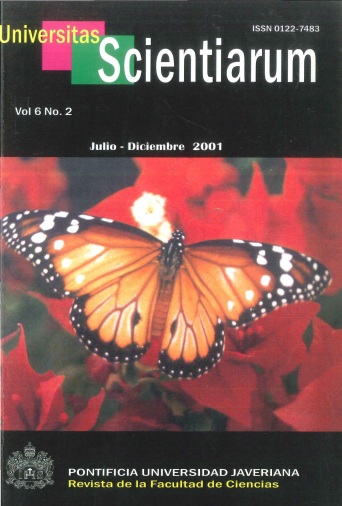Abstract
With the objective of detemúning the genotypes of canine parvovirus (CPV) circulating in Bogotá, 56 fecal and blood samples were obtained from younger dogs, up to a year old with hemorrhagic gastroenteritis for its analysis by the polymerase chain reaction - fingerprints (PCR - RFLP) assay. DNA fragments were obtained from (2,2 Kb) a representative vaccine strain of parvovirus type -2 (CPV-2) and from the four fecal samples were amplified by the PCR assay; they were not obtained from the amplification of the blood samples. The amplified products were digested by the restriction enzyme Rsa I, pemútting the identification of genotypes PCV-2a and PCV-2b and the differentiation of CPV-2 from CPV-2a and CPV-2b.Univ. Sci. is registered under a Creative Commons Attribution 4.0 International Public License. Thus, this work may be reproduced, distributed, and publicly shared in digital format, as long as the names of the authors and Pontificia Universidad Javeriana are acknowledged. Others are allowed to quote, adapt, transform, auto-archive, republish, and create based on this material, for any purpose (even commercial ones), provided the authorship is duly acknowledged, a link to the original work is provided, and it is specified if changes have been made. Pontificia Universidad Javeriana does not hold the rights of published works and the authors are solely responsible for the contents of their works; they keep the moral, intellectual, privacy, and publicity rights. Approving the intervention of the work (review, copy-editing, translation, layout) and the following outreach, are granted through an use license and not through an assignment of rights. This means the journal and Pontificia Universidad Javeriana cannot be held responsible for any ethical malpractice by the authors. As a consequence of the protection granted by the use license, the journal is not required to publish recantations or modify information already published, unless the errata stems from the editorial management process. Publishing contents in this journal does not generate royalties for contributors.



